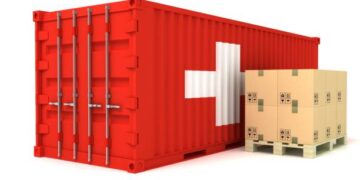ZURICH, Jan 2 (Reuters) – The Swiss government announced on Tuesday the abolition of import duties on a range of industrial products, a decision aimed at reducing costs for both consumers and manufacturers.
This policy change is expected to bring about direct savings, decrease administrative efforts, and lead to lower prices for a wide array of products, from industrial machinery to consumer items like clothing and refrigerators. The move is seen as particularly beneficial for companies grappling with rising costs due to global inflation and the appreciation of the Swiss franc, which has increased the expense of Swiss exports in international markets.
The State Secretariat for Economic Affairs (SECO) estimates that the annual economic benefit of this decision will exceed 860 million Swiss francs ($1.02 billion). This figure includes lower purchasing and administrative costs for businesses, as well as productivity improvements.
In 2022, imports constituted about 43% of Switzerland’s economic output. The country is known for hosting major multinational corporations, including pharmaceutical giants Roche and Novartis, food and beverage company Nestle, and engineering firm ABB.
The elimination of import duties covers a broad spectrum of products such as capital goods, raw materials, semi-finished goods, machinery, and various consumer products including bicycles, household appliances, and clothing. However, this policy does not extend to agricultural products like live animals, plants, seeds, and animal feed.
The Swiss government views the removal of these tariffs as a significant step towards enhancing Switzerland’s position as a key business and industrial center. By alleviating financial and administrative burdens, the decision is expected to facilitate the procurement of competitive inputs for Swiss industries and promote diversification. This, in turn, is likely to boost productivity of Swiss companies both domestically and internationally, enhancing their competitive edge and smoothing trade relations.
The decision to scrap these tariffs, which was initially made by the Swiss parliament in October 2021, officially came into effect on January 1.
While no specific measures have been implemented to counterbalance the reduction in customs revenue, the government anticipates that the resulting increase in economic output will lead to higher tax collections in the future, thereby offsetting any potential revenue loss.
Catch the latest in supply chain news on The Supply Chain Report. Visit ADAMftd.com for free international trade tools.
#SwissGovernment #ImportDutyAbolition #IndustrialProducts #CostReduction #EconomicBenefit #ConsumerSavings #GlobalInflation #SwissFranc #MultinationalCorporations #Roche #Novartis #Nestle #ABB #ProductivityBoost #CompetitiveEdge #TradeRelations #BusinessCenter















